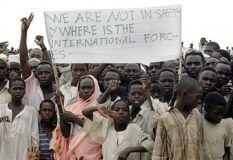If Sudan reneges on UN force, it could face punitive measures
Dec 30, 2006 (WASHINGTON) — The Bush administration, while cautiously welcoming Sudan’s acceptance of a United Nations peace plan for the Darfur region, has an array of economic and military sanctions available for consideration if the Islamic government reneges on its commitment.
 At issue is a three-stage plan to send some 20,000 U.N. peacekeepers and police to Darfur to provide protection to the 2.5 million Darfurians who have been uprooted from their homes since early 2003 as a result of sectarian conflict. Fatalities number in excess of 200,000, victims of violence as well as malnutrition and disease.
At issue is a three-stage plan to send some 20,000 U.N. peacekeepers and police to Darfur to provide protection to the 2.5 million Darfurians who have been uprooted from their homes since early 2003 as a result of sectarian conflict. Fatalities number in excess of 200,000, victims of violence as well as malnutrition and disease.
Sudanese President Omar al-Bashir indicated last Tuesday — just days ahead of a Jan. 1 deadline — a willingness to go along with the plan. Bashir said the proposed creation of a hybrid U.N.-African Union force to bring stability to Darfur “constitutes a viable framework for peaceful settlement.”
For months, Bashir had said that a U.N. deployment in Darfur would signify recolonization of his country.
But, as U.N. diplomats point out, al-Bashir remains opposed to any large-scale dispatch of U.N. troops. His U.N. ambassador raised eyebrows when he contradicted the spirit of al-Bashir’s letter by flatly ruling out any U.N. peacekeeping operation in Darfur. The State Department took note of the envoy’s remarks but said it should not be given the same weight as the presidential letter.
But given al-Bashir’s track record, including years of support for local militia attacks on innocent civilians in Darfur, there is broad skepticism here about his willingness to cooperate.
Andrew Natsios, special envoy to Sudan, said he told the Sudanese in early December that full compliance with the U.N. plan is essential, warning that, “If you starting cherry picking you will essentially collapse the whole plan.”
That could lead, according to Secretary of State Condoleezza Rice and other officials, to the imposition of punitive measures against Sudan that have been approved by the U.N. Security Council but not yet implemented.
One such measure is the establishment of a no-fly zone over Darfur to spare its residents further attacks by Sudanese military aircraft. The idea is backed by British Prime Minister Tony Blair.
Mark Schneider, a vice president of the International Crisis Group, which monitors global hotspots, said the plan has merit but carries risks.
He said that if a Sudanese plane violated the zone and were shot down, the Khartoum government could retaliate by attacking camps that now teem with Darfur’s displaced. To avoid a massacre at the camps, Schneider recommends deployment of a rapid reaction force across the border in Eastern Chad.
Sen. Russ Feingold, a Wisconsin Democrat., has backed a no-fly zone as well as “placing economic sanctions on perpetrators of the violence.”
Sudanese Foreign Minister Lam Akol, urging that Sudan be left alone, says “threats and blockades, and no-fly zones, would not solve the problem, but would increase suffering in Darfur.”
Other possible punitive options against Sudan include the banning of international travel by Sudanese officials responsible for atrocities; the freezing of their overseas assets; and imposing sanctions against certain commercial entities, including the petroleum sector, a major foreign exchange earner.
Both outgoing U.N. Secretary General Kofi Annan and President George W. Bush have invested considerable political capital in ending the sectarian misery in Darfur.
Annan was the major instigator of the deal that al-Bashir signed off on this past week. It won support from a broad spectrum of countries, including some which had advocated a hands-off U.N. policy toward Darfur. Examples are China and some Arab countries.
As for Bush, he famously once wrote in the margin of a report describing the 1994 Rwanda genocide, “not on my watch” — meaning that as president he would act to prevent a similar occurrence. The words have become a rallying cry for the nationwide movement that has demanded decisive international action to bring peace to Darfur.
Rep. Tom Lantos, a California Democrat and the incoming chairman of the House International Relations Committee, is a strong advocate of military action in Darfur and said the United States, after taking on Iraq, should not worry about the “p.r. ramifications” of using force against another Muslim country.
“We would not be taking action against a Muslim country. We would be saving people who are in desperate need of outside help,” he said.
(AP)
